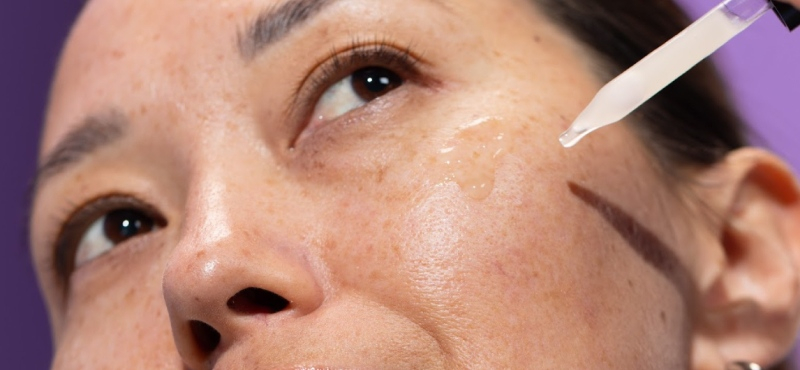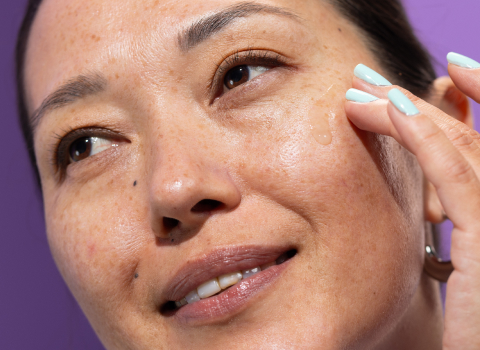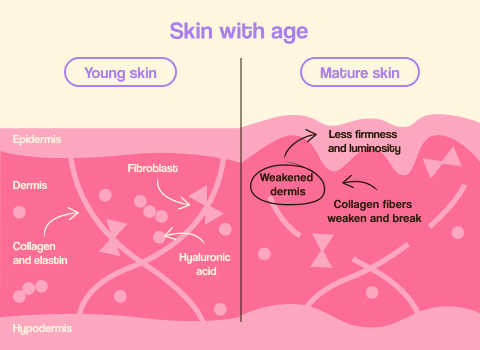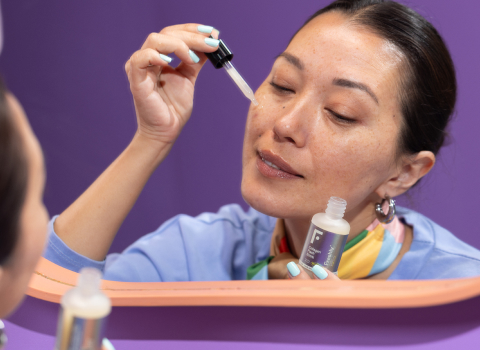We reveal the secret of collagen for the skin and how to achieve the good face effect you are looking for

Here are your essentials
for making it this far
Surely you have heard about collagen on numerous occasions, but... Do you really know what it is and the importance it has for our skin? We're here to help! Let's dive into... "Everything you should know about collagen and its benefits for the skin."
What is collagen?
Did you know that collagen is the most abundant protein in your body?! It represents nothing less than 25% of the total protein in your body! It is present in bones, tendons, cartilage, arteries, and the skin... To give you an idea, our body has at least 28 different types of collagen. Amazing, right? The Freshly Team was also amazed when the chemical engineers on the team explained it to us.
What function does collagen have for the skin?
Your time is precious. You know it. We know it. That's why we'll summarize it in just one line:
Collagen is responsible for providing support, ultimately making your skin firm.
Where does collagen come from?
Fibroblasts are the cells in the dermis responsible for producing collagen. They are also responsible for the production of elastin, which is closely related to collagen.
What is elastin and how is it related to collagen?
Elastin is the protein responsible for providing flexibility to the skin, allowing it to stretch at certain moments and return to its original state, ensuring that tissues return to their original structure without any problem.
The combination and proper functioning of collagen and elastin make our skin look firm, smooth, and radiant. In short, it gives you that feeling of a good complexion that you love so much, like when you've slept for 15 hours straight! If only that were possible...
With that said, and having clarified the basic concepts related to collagen, let's now move on to how you notice your skin and how collagen can help you improve its appearance.

Why does my skin appear tired, dull, and have expression lines? What's the reason?
We're going to tell you something that you may have never been told before. Starting at the age of 25, fibroblasts (remember: the cells that produce collagen and elastin) become less active, and collagen production decreases by 1-1.5% per year. After menopause, these levels reach 2% per year, which is reflected in skin with less density and support, resulting in less smooth, plump, and firm skin. Relax! Don't give up just yet, there are ways to compensate for this natural collagen loss. We'll tell you how in a moment.
How is collagen produced in my skin?
As we mentioned before, fibroblasts are responsible for producing collagen. But in addition, our body has the ability to compensate for the loss of collagen through a complex synthesis process. In other words, our own body is a source of collagen in itself. Amazing, right?
How does it do it? Let us briefly explain it to you; by combining amino acids, it creates polypeptides that eventually generate a pro-collagen molecule. This molecule travels to the extracellular space, where it removes its ends to transform into a collagen molecule, which, when combined with others, forms fibrils, which in turn constitute thicker new fibers, what we know as collagen fibers.
But wait! At the same time, our body has enzymes responsible for degrading collagen proteins in the dermis. That is, in our body, we manage to create and degrade collagen at the same time. How is this possible? It's all about balance. Now let us tell you more...
Why does my skin lose collagen?
When fibroblasts create collagen through the synthesis process we mentioned, and the enzymes responsible for degrading it (metalloproteinases) coexist harmoniously, we ensure that collagen fulfills its structural function in the dermis, and your skin looks healthy.
However, over the years, fibroblasts do not function at their full capacity, resulting in less collagen being generated than necessary. However, the enzymes continue degrading collagen at the same rate, which leads to an imbalance and disrupts the harmony.
Let's give an example, it's like having a house that gets its electricity solely from solar panels. Every day the sun (fibroblasts) provides you with the energy you need, but when there is a storm and it remains cloudy for several days, the energy generation will slow down or stop. However, you continue to consume electricity (enzymes) in your daily life, causing an imbalance. And even if the sun doesn't shine for weeks, your energy levels will be greatly reduced, and your appliances will not work correctly or stop working.
In this case, it's the same, the balance between the production and degradation of collagen fibers in the dermis is disrupted.
Let's visualize it more clearly. Let's consider the relationship between how my face looks and what really happens inside my skin when my collagen levels are imbalanced.

What do we see in the image?
1- FRAGMENTATION: Collagen fibers fragment, just like a rope that holds a swing, for example, loses tension and breaks some of its fibers, becoming thinner and significantly reducing its stability. Similarly, collagen fibers weaken and break, reducing the thickness of the dermis, resulting in less plump, dense, and firm skin.
2- IMBALANCE: On the other hand, there is disorganization caused by the imbalance we mentioned between collagen production and degradation. This leads to fewer thick, strong, and resistant collagen fibers. Consequently, the underlying structure of our dermis becomes weakened.
When this occurs within our organism, what translates to the exterior is a lack of smoothness, sagging, the appearance of expression lines, and a lack of luminosity, does that sound familiar?
The good news? This process can be rebalanced: you can compensate for the natural loss of collagen in a way that your skin will love.
How can I compensate for the loss of collagen?
Now that we know why your skin appears fatigued and the relationship it has with collagen, let's see how to compensate for that loss of collagen. Take note!
- Nutrition, include these nutrients in your diet
There are ingredients you can include in your diet to help collagen production in your body. Some of these nutrients include:
- Vitamin C: In addition to finding it in citrus fruits like orange or lemon, it is also present in peppers and tomatoes.
- Vitamin A: Find it in carrots, onions, and leafy green vegetables.
- Proteins with amino acids: Present in milk, eggs, meat, and fatty fish.
It is important to note that nutrition can stimulate collagen production in your body, but if you are looking for a "good face effect" or specifically want to increase collagen levels in the dermis, cosmetic products will become your ally.
What is the most effective and healthy natural collagen? There are three types of collagen
The cosmetic industry has been developing products for a while now to reduce or halt collagen loss in the skin. Currently, you can find 3 types of collagen on the market:
-Animal-derived collagen
Specifically obtained from pigs and cows. The collagen molecule coincides 95% with human collagen. It is the most commonly used option by the cosmetic industry so far.
-Marine collagen
This is the second generation of collagen developed by the cosmetic industry and comes from fish. The collagen molecule obtained coincides 30% with human collagen.
-By biotechnology
This is the most recent and innovative alternative developed so far. It is a vegan option obtained through biotechnology and is 100% identical to human collagen.
We assume that now you may be wondering, "And... where can I find this new generation of collagen identical to humans?"

The collagen serum for the skin you've been looking for
We can't stop time or sleep 15 hours a day... Oh, how we wish we could! That's why, to effectively compensate for the natural loss of collagen in our skin, we have developed the collagen serum, Collagen Flash Bomb, a 99.9% natural formula that features this new generation of collagen obtained through biotechnology, 100% identical to humans.
The most effective hydrolyzed vegan collagen
The Vegan Collagen active ingredient from Freshly has a DNA sequence identical to that of the human COL1A2 gene. Therefore, it is more effective than marine or animal collagen, widely used in conventional cosmetics.
.jpg)
This collagen is also hydrolyzed (i.e., cut into very small fragments) to obtain a final product with a smaller molecular weight. And why is this done? In this way, it manages to penetrate better into the dermis and reach exactly where it needs to go to have its effect. The collagen energy boost your skin needs! Get it now in the exclusive pre-sale.
The science we love
Freshly wants to tell you something! At Freshly we keep on learning every day how to make decisions that bring us closer to a better future. Sometimes we are called dreamers, but what we really have is an optimistic vision and clear path for reaching that tomorrow.
Would you like to join this adventure? If you're here, it's because you are a demanding person when it comes to taking care of your body and the planet. By subscribing to the newsletteryou will receive articles like this one to continue learning, as well as news and exclusive discounts. Are you up for it?



